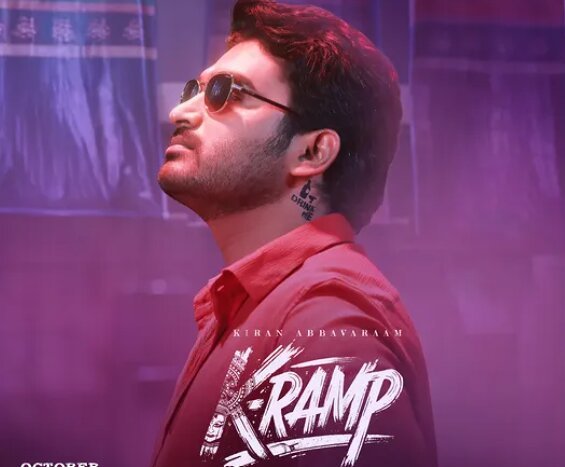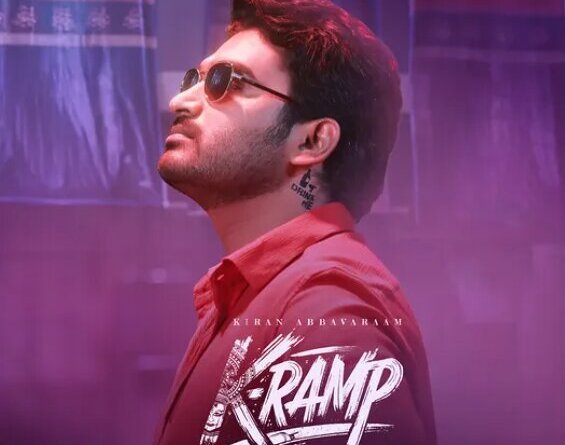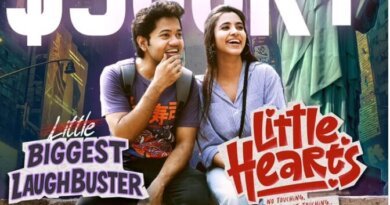K-RAMP MOVIE REVIEW

Cast – Kiran Abbavaram, Yukti Thareja, Naresh, Sai Kumar, Ali, Srinivasa Reddy, Goparaju Ramana, Muralidhar Goud, Vennela Kishore, Sanjay Swaroop, Kamna Jethmalani
Directors – Jains Nani
Producers – Razesh Danda, Balaji Gutta, Shiva Bommak
Banner – Hasya Movies, Rudransh Celluloids
Music – Chaitan Bharadwaj
Runtime – 2 Hours 20 Minutes
Genre – Romantic Comedy
Release Date – 18 October 2025
Background
Kiran Abbavaram returns to the Diwali season with another entertainer after his previous success, KA. This time, he dives into the romantic comedy genre with K-Ramp, directed by debutant Jains Nani. The film generated buzz due to its quirky title and the actor’s growing popularity. Yukti Thareja plays the female lead, marking a significant role in her career. The production houses Hasya Movies and Rudransh Celluloids aimed to deliver a light-hearted yet emotionally resonant film. The backdrop of Kerala adds visual charm to the narrative. The film attempts to blend humor with a sensitive theme like PTSD, which is a bold move for a debut director. With a mix of seasoned actors and fresh faces, the film sets out to entertain while tackling emotional depth. The music by Chaitan Bharadwaj was expected to elevate the romantic tone. However, the film’s success hinges on its ability to balance comedy and sentiment. The pre-release promotions focused heavily on Kiran’s comic timing and the film’s unique premise. The audience walked in expecting a laugh riot with a twist of drama.
Plot
Kumar Abbavaram, a carefree youth from a wealthy family, falls head over heels for Mercy Joy. His love proposal is met with hesitation but eventually accepted. Just when their romance begins to blossom, Mercy’s behavior turns erratic, culminating in a suicide attempt. Kumar is left shocked and desperate to understand her trauma. The story unfolds as Kumar digs into Mercy’s past, uncovering a painful backstory that explains her actions. His journey to help her recover forms the emotional core of the film. The narrative explores how love and empathy can heal deep wounds.
Artists Performances
Kiran Abbavaram shines in comic sequences, showing marked improvement in timing and delivery. His emotional performance in the pre-climax adds depth to his character. Yukti Thareja looks appealing and handles her role decently, though a more seasoned actress might have added gravitas. Sai Kumar brings warmth and humor as the hero’s father, especially in emotional scenes. Naresh’s character feels miscast and his track lacks finesse. Ali, Srinivasa Reddy, and Muralidhar Goud provide scattered laughs. Vennela Kishore’s scenes are inconsistent, with only his bar sequence standing out. Sanjay Swaroop is effective in a brief role. Kamna Jethmalani’s appearance is fleeting and forgettable.
Technicalities
The music by Chaitan Bharadwaj is functional but lacks chartbuster appeal. Background score is adequate, not memorable. Cinematography by Sateesh Reddy Masam captures Kerala’s beauty effectively. Editing by Chota K. Prasad could have been tighter; several scenes feel stretched. Production values are modest, reflecting budget constraints. Dialogues range from witty to crass, affecting tonal consistency. Costume design suits the characters well. Art direction is simple and serviceable. Sound design is clean but not impactful. The screenplay falters in the second half, losing momentum.
Positives
Pre-interval sequence delivers strong emotional impact
Kiran Abbavaram’s comic timing keeps the audience engaged
Comedy portions in both halves offer genuine laughs
Emotional realization scene in pre-climax is well executed
Negatives
Naresh’s ‘lover boy’ track feels forced and tasteless
Songs lack replay value and fail to elevate the narrative
Excessive use of cuss words limits family audience appeal
Analysis
K-Ramp attempts a daring blend of comedy and trauma, using PTSD as a narrative pivot. While this choice is bold, it risks trivializing a serious issue. The film’s first half sets up the romance and humor effectively, with Kiran Abbavaram’s antics drawing laughter. His chemistry with Yukti Thareja is passable, though not electric. The pre-interval twist adds intrigue, revealing Mercy’s troubled past. Post-interval, the film maintains momentum for about thirty minutes, delivering solid comedy and emotional beats. However, the screenplay begins to falter thereafter. Repetitive scenes and filler content dilute the impact. Naresh’s character, intended for comic relief, ends up being a liability due to poor writing and execution. Vennela Kishore’s track, though promising, fizzles out quickly. The film’s tone oscillates between slapstick and sentiment, often jarring the viewer. The emotional climax is handled with sincerity, showcasing Kiran’s growth as an actor. Yet, the resolution feels rushed and lacks depth. The music fails to leave a lasting impression, a missed opportunity in a romantic comedy. The dialogues, while occasionally witty, often veer into crude territory. This limits the film’s appeal to a broader audience. The cinematography stands out, especially in outdoor sequences. Editing could have trimmed the fat, making the narrative crisper. The production design is minimal, focusing more on performances than visual grandeur. Overall, K-Ramp is a mixed bag. It entertains in parts, especially for fans of over-the-top comedy. But it struggles with consistency and sensitivity. The film’s heart is in the right place, but its execution wavers. For viewers seeking light entertainment with a few laughs, K-Ramp offers a decent watch. However, those expecting a nuanced take on trauma or a tight romantic narrative may be disappointed. The film’s strength lies in its lead actor’s comic timing and a few well-crafted sequences. Its weakness is the lack of cohesion and tonal discipline. The director shows promise but needs refinement in handling complex themes.
Final verdict :- partly fun, partly cringe, but worth a watch for comedy lovers
Rating :- 2.5/5




